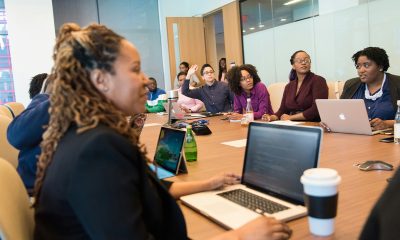Business
Why U.S. Economic Growth Has Disappointed This Year

In this Friday, Feb. 6, 2015 file photo, a shopper pays for produce at a Farmers Market in downtown Los Angeles. Consumers have been uncharacteristically frugal, even as the country added jobs and a sharp drop in gas prices over the past year left them more money to spend. (AP Photo/Richard Vogel, File)
Christopher S. Rugaber, ASSOCIATED PRESS
WASHINGTON (AP) — Like an underachieving student, the U.S. economy isn’t living up to the high hopes it began the year with.
Consumers have been uncharacteristically frugal, even as the country added jobs and a sharp drop in gas prices over the past year left them more money to spend. Meanwhile, drilling companies reeling from cheaper oil have slashed spending much more rapidly than anyone expected.
A host of other, mostly temporary, factors have also weighed on growth. Harsh winter weather kept shoppers at home, and a labor dispute at West Coast ports slowed exports.
Yet hope is still alive for the second half of the year amid signs that the economy could regain lost momentum.
Employers are holding onto their existing workers, keeping layoffs at rock bottom, and adding staff — evidence that their outlook remains positive.
In a report Thursday, the government said applications for unemployment benefits are at the lowest level in 15 years, which means layoffs are low and job security is very high. Employers added 223,000 jobs in April, and the unemployment rate fell to 5.4 percent.
“Companies are implicitly telling us that they believe this is temporary,” says Joseph LaVorgna, an economist at Deutsche Bank. “They’re looking through the weakness from the ports and the weather.”
Indeed, the first half of the year is shaping up to be surprisingly lackluster.
Analysts estimate the economy may expand at an annual rate of just 2 percent in the April-June quarter after barely discernable growth of 0.2 percent in the January-March quarter. Some economists say the government’s next revision will likely send the figure into negative territory, possibly as low as minus 1 percent.
That would put growth in the first half of 2015 at a “pretty disappointing” 0.5 percent, says Michael Feroli, an economist at JPMorgan Chase. That’s a far cry from the 3 percent pace for all of 2015 that most economists expected late last year. Growth hasn’t reached that level since 2005.
The biggest reason behind the disappointment is consumers, who were widely expected to return to their free-spending ways.
Gas prices are still about $1 a gallon cheaper nationwide than a year ago, despite some recent increases. Steady hiring in the past year means 3 million more people are earning paychecks compared with a year ago. And consumer confidence has also risen in recent months.
Yet in the first three months of the year, Americans increased their spending by just 1.9 percent, the weakest gain in a year. A report on restaurant and retail sales Wednesday showed that spending was flat in April, crushing hopes for a stronger rebound.
“The disappearance of consumer spending in early 2015 has now become even more mysterious, as some of the excuses shopped around earlier, like bad weather, are looking more stretched with the passage of time,” Feroli says.
Most economists have concluded that Americans, at least so far, are reluctant to spend their savings from cheaper gas because they believe the drop in prices will be temporary. Meanwhile, spending by oil and gas companies on drilling rigs, steel pipes and other equipment plummeted nearly 50 percent in the first quarter, a much steeper drop than economists forecast.
“We expected (cheaper gas) to have a positive impact,” Paul Ashworth, an economist at Capital Economics, said. “It hasn’t.”
So are things turning around? Short answer: probably.
Many trends currently weighing on growth should fade. International trade will be less of a drag in the second half of the year, economists say. The dollar’s rise against other major currencies, such as the euro, has leveled off. A strong dollar has made exports more expensive, hurting sales in overseas markets.
A surge of imports in March, which widened the trade gap and cut growth, was probably a one-time event triggered by the resolution of the West Coast port dispute.
Consumer spending should rebound from the first quarter’s unusually low level. And spending by energy companies will likely stop falling by the third quarter, LaVorgna said. He expects growth will reach a 3 percent annual rate in the second half.
Home construction is also poised to lift growth. Harsh weather postponed many projects in January and February, but homebuilding rose 2 percent in March from the previous month.
Steady job gains will also help, giving more Americans paychecks that they will ideally spend.
___
Contact Chris Rugaber on Twitter at http://Twitter.com/ChrisRugaber
Copyright 2015 The Associated Press. All rights reserved. This material may not be published, broadcast, rewritten or redistributed.
###
Bay Area
State Controller Malia Cohen Keynote Speaker at S.F. Wealth Conference
California State Controller Malia Cohen delivered the keynote speech to over 50 business women at the Black Wealth Brunch held on March 28 at the War Memorial and Performing Arts Center at 301 Van Ness Ave. in San Francisco. The Enterprising Women Networking SF Chapter of the American Business Women’s Association (ABWA) hosted the Green Room event to launch its platform designed to close the racial wealth gap in Black and Brown communities.

By Carla Thomas
California State Controller Malia Cohen delivered the keynote speech to over 50 business women at the Black Wealth Brunch held on March 28 at the War Memorial and Performing Arts Center at 301 Van Ness Ave. in San Francisco.
The Enterprising Women Networking SF Chapter of the American Business Women’s Association (ABWA) hosted the Green Room event to launch its platform designed to close the racial wealth gap in Black and Brown communities.
“Our goal is to educate Black and Brown families in the masses about financial wellness, wealth building, and how to protect and preserve wealth,” said ABWA San Francisco Chapter President LaRonda Smith.
ABWA’s mission is to bring together businesswomen of diverse occupations and provide opportunities for them to help themselves and others grow personally and professionally through leadership, education, networking support, and national recognition.
“This day is about recognizing influential women, hearing from an accomplished woman as our keynote speaker and allowing women to come together as powerful people,” said ABWA SF Chapter Vice President Velma Landers.
More than 60 attendees dined on the culinary delights of Chef Sharon Lee of The Spot catering, which included a full soul food brunch of skewered shrimp, chicken, blackened salmon, and mac and cheese.
Cohen discussed the many economic disparities women and people of color face. From pay equity to financial literacy, Cohen shared not only statistics, but was excited about a new solution in motion which entailed partnering with Californians for Financial Education.
“I want everyone to reach their full potential,” she said. “Just a few weeks ago in Sacramento, I partnered with an organization, Californians for Financial Education.
“We gathered 990 signatures and submitted it to the [California] Secretary of State to get an initiative on the ballot that guarantees personal finance courses for every public school kid in the state of California.
“Every California student deserves an equal opportunity to learn about filing taxes, interest rates, budgets, and understanding the impact of credit scores. The way we begin to do that is to teach it,” Cohen said.
By equipping students with information, Cohen hopes to close the financial wealth gap, and give everyone an opportunity to reach their full financial potential. “They have to first be equipped with the information and education is the key. Then all we need are opportunities to step into spaces and places of power.”
Cohen went on to share that in her own upbringing, she was not guided on financial principles that could jump start her finances. “Communities of color don’t have the same information and I don’t know about you, but I did not grow up listening to my parents discussing their assets, their investments, and diversifying their portfolio. This is the kind of nomenclature and language we are trying to introduce to our future generations so we can pivot from a life of poverty so we can pivot away and never return to poverty.”
Cohen urged audience members to pass the initiative on the November 2024 ballot.
“When we come together as women, uplift women, and support women, we all win. By networking and learning together, we can continue to build generational wealth,” said Landers. “Passing a powerful initiative will ensure the next generation of California students will be empowered to make more informed financial decisions, decisions that will last them a lifetime.”
Business
Black Business Summit Focuses on Equity, Access and Data
The California African American Chamber of Commerce hosted its second annual “State of the California African American Economy Summit,” with the aim of bolstering Black economic influence through education and fellowship. Held Jan. 24 to Jan. 25 at the Westin Los Angeles Airport Hotel, the convention brought together some of the most influential Black business leaders, policy makers and economic thinkers in the state. The discussions focused on a wide range of economic topics pertinent to California’s African American business community, including policy, government contracts, and equity, and more.

By Solomon O. Smith, California Black Media
The California African American Chamber of Commerce hosted its second annual “State of the California African American Economy Summit,” with the aim of bolstering Black economic influence through education and fellowship.
Held Jan. 24 to Jan. 25 at the Westin Los Angeles Airport Hotel, the convention brought together some of the most influential Black business leaders, policy makers and economic thinkers in the state. The discussions focused on a wide range of economic topics pertinent to California’s African American business community, including policy, government contracts, and equity, and more.
Toks Omishakin, Secretary of the California State Transportation Agency (CALSTA) was a guest at the event. He told attendees about his department’s efforts to increase access for Black business owners.
“One thing I’m taking away from this for sure is we’re going to have to do a better job of connecting through your chambers of all these opportunities of billions of dollars that are coming down the pike. I’m honestly disappointed that people don’t know, so we’ll do better,” said Omishakin.
Lueathel Seawood, the president of the African American Chamber of Commerce of San Joaquin County, expressed frustration with obtaining federal contracts for small businesses, and completing the process. She observed that once a small business was certified as DBE, a Disadvantaged Business Enterprises, there was little help getting to the next step.
Omishakin admitted there is more work to be done to help them complete the process and include them in upcoming projects. However, the high-speed rail system expansion by the California High-Speed Rail Authority has set a goal of 30% participation from small businesses — only 10 percent is set aside for DBE.
The importance of Diversity, Equity and Inclusion (DEI) in economics was reinforced during the “State of the California Economy” talk led by author and economist Julianne Malveaux, and Anthony Asadullah Samad, Executive Director of the Mervyn Dymally African American Political and Economic Institute (MDAAPEI) at California State University, Dominguez Hills.
Assaults on DEI disproportionately affect women of color and Black women, according to Malveaux. When asked what role the loss of DEI might serve in economics, she suggested a more sinister purpose.
“The genesis of all this is anti-blackness. So, your question about how this fits into the economy is economic exclusion, that essentially has been promoted as public policy,” said Malveaux.
The most anticipated speaker at the event was Janice Bryant Howroyd known affectionately to her peers as “JBH.” She is one of the first Black women to run and own a multi-billion-dollar company. Her company ActOne Group, is one of the largest, and most recognized, hiring, staffing and human resources firms in the world. She is the author of “Acting Up” and has a profile on Forbes.
Chairman of the board of directors of the California African American Chamber of Commerce, Timothy Alan Simon, a lawyer and the first Black Appointments Secretary in the Office of the Governor of California, moderated. They discussed the state of Black entrepreneurship in the country and Howroyd gave advice to other business owners.
“We look to inspire and educate,” said Howroyd. “Inspiration is great but when I’ve got people’s attention, I want to teach them something.”
Activism
Oakland Post: Week of April 17 – 23, 2024
The printed Weekly Edition of the Oakland Post: Week of April 17 – 23, 2024

To enlarge your view of this issue, use the slider, magnifying glass icon or full page icon in the lower right corner of the browser window. ![]()
-

 Activism4 weeks ago
Activism4 weeks agoOakland Post: Week of March 27 – April 2, 2024
-

 #NNPA BlackPress4 weeks ago
#NNPA BlackPress4 weeks agoCOMMENTARY: D.C. Crime Bill Fails to Address Root Causes of Violence and Incarceration
-

 #NNPA BlackPress4 weeks ago
#NNPA BlackPress4 weeks agoFrom Raids to Revelations: The Dark Turn in Sean ‘Diddy’ Combs’ Saga
-

 #NNPA BlackPress4 weeks ago
#NNPA BlackPress4 weeks agoCOMMENTARY: Lady Day and The Lights!
-

 #NNPA BlackPress4 weeks ago
#NNPA BlackPress4 weeks agoMayor, City Council President React to May 31 Closing of Birmingham-Southern College
-

 #NNPA BlackPress4 weeks ago
#NNPA BlackPress4 weeks agoBaltimore Key Bridge Catastrophe: A City’s Heartbreak and a Nation’s Alarm
-

 #NNPA BlackPress4 weeks ago
#NNPA BlackPress4 weeks agoBaltimore’s Key Bridge Struck by Ship, Collapses into Water
-

 #NNPA BlackPress4 weeks ago
#NNPA BlackPress4 weeks agoBeloved Actor and Activist Louis Cameron Gossett Jr. Dies at 87




















































